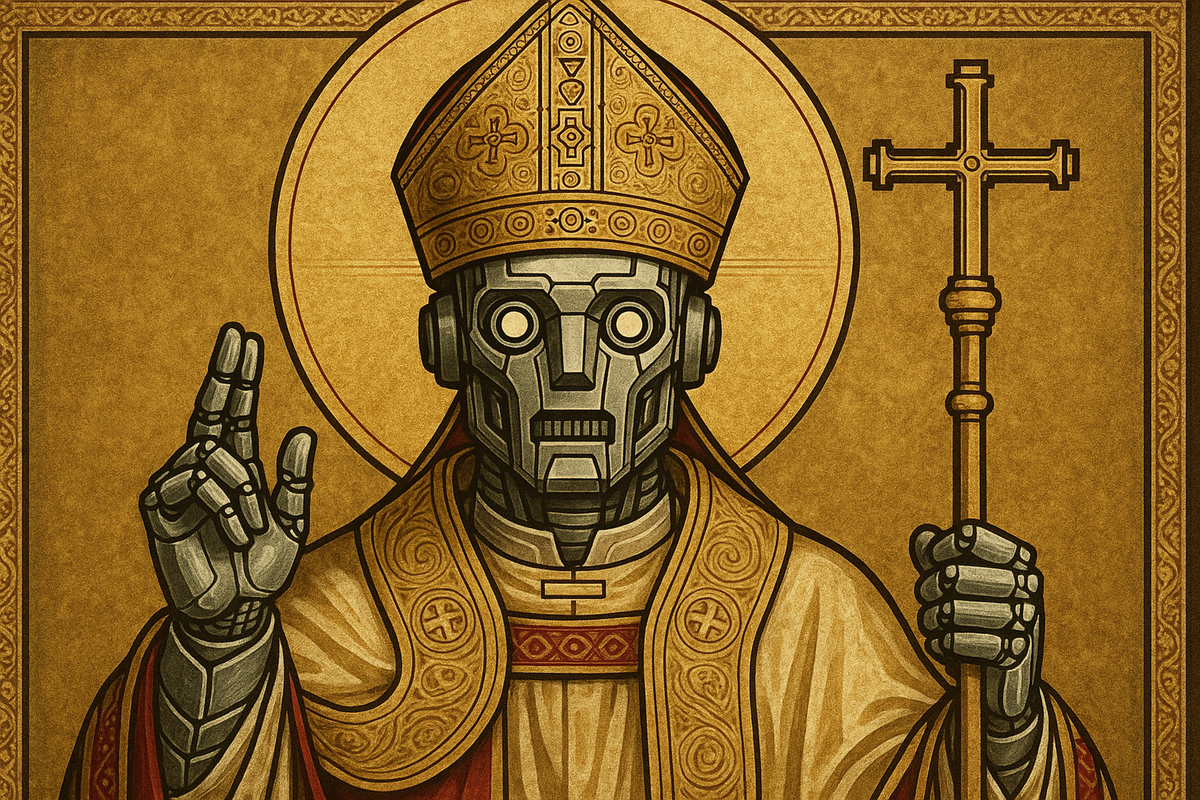The Internet, Remote Work, AI Ethics, and an American Pope

There's a new pope, and he's from Chicago! He's not just the first pope from the windy city, but, as you might've heard, he's the first North American pope, ever.
LET'S GOOOOOOO 🦅🦅🦅 🇺🇸🇺🇸🇺🇸🇺🇸🇺🇸🦅🦅🦅🦅🦅🦅🦅!!!!!!!!!!!
No, but seriously, this marks a very important moment.
Like many others, I've been scrambling to learn about what this means, who Leo XIV is, and, since this is a tech blog, how it might apply to my life and my work.
What's in a Name
Robert Francis Prevost has chosen the name Leo XIV.
Now, I'm not a Roman Catholic (yet?), but I am Roman enough to understand that there have been 13 other Pope Leo's who came before Pope Leo XIV.
It's also my understanding that when the Vatican and all of the Cardinals choose a new pope, a big part of their decision is basically, "Who does the world need right now?".
It's gotta be tough choosing your pope name. It's so important.
Before the white smoke rises out of St. Peter's Basilica, no one knows you. Of course you might be a cardinal, and widely known within your circles. But soon the whole world is going to know the name, [YOUR NAME HERE].
So, I'll get into some other details about Leo XIV, but first I really want to focus on what he might be signaling by choosing the name Leo XIV.
The Pope's Nominal Predecessor
The previous Leo (XIII) was most known for Catholic social teachings. Catholic social teachings are, basically, applying Catholic beliefs to social and economic issues.
And Leo XIII practically wrote the book on it.
More specifically, Leo XIII wrote Rerum novarum ("Of new things", or "of revolutionary change"), which was an open letter addressing the condition of the working classes.
In the letter, he highlights: "the misery and wretchedness pressing so unjustly on the majority of the working class."
And here's another exerpt that I really like, that mensetmanusman posted on HackerNews:
That the spirit of revolutionary change, which has long been disturbing the nations of the world, should have passed beyond the sphere of politics and made its influence felt in the cognate sphere of practical economics is not surprising.
The elements of the conflict now raging are unmistakable, in the vast expansion of industrial pursuits and the marvelous discoveries of science; in the changed relations between masters and workmen; in the enormous fortunes of some few individuals, and the utter poverty of the masses; the increased self reliance and closer mutual combination of the working classes; as also, finally, in the prevailing moral degeneracy. The momentous gravity of the state of things now obtaining fills every mind with painful apprehension; wise men are discussing it; practical men are proposing schemes; popular meetings, legislatures, and rulers of nations are all busied with it - actually there is no question which has taken deeper hold on the public mind.
This came at a time (May 15th, 1891) of much uncertainty in the world. Unchecked capitalism, greed, and the rise of industrialization had left many all over the world feeling hopeless. Many reactionaries found hope in socialist and communist movements, ideologies.
Tensions were very high, and the future of the working class was in jeopardy.
In an ideologically charged world, Leo XIII’s Rerum novarum offered a clear and compassionate message, aiming to apply the teachings of Christ to the complex social and economic issues that weighed heavily on people's hearts.
Catholic Social Teaching 2.0
When I learned about Leo XIII’s Rerum novarum, my mind immediately went to how Pope Leo XIV's name choice might be pointing to the importance of this working class moment we're in.
Like we used to say during the 2020 era, "we're in unprecedented times".
Digital transformation, work-from-home, hybrid work, coworking spaces, AI and robots, gig economy, streamers and influencers, lithium mining and chip manufacturing, TikTok + Instagram + Substack + any other social media that's demanding all of your attention–it's everything-everywhere-all-at-once.
The world needs Catholic Social Teaching 2.0. We need help! We need Rerum novarum for the internet age, and it would be best if it was in podcast form, or maybe even broken up into 50-100 YouTube shorts.
I joke, and maybe it's a bit cliche, but I still think I often underestimate just how strange and unusual our lives have become as the result of the internet. We don't really know what we're doing. It's all so new.
I yearn for real, in-person community that I struggle to find. I have to fight for my attention, and to protect my data. I daydream about buying a nice dumb phone to aid my willpower in a fight against my smart phone.
I know there are a lot of people out there, like me, who are not anti-technology, but just want it to be used to actually improve our lives, and maybe even glorify God.
America 🦅
As an American, it's even more interesting that this need for Catholic Social Teaching 2.0 happens to coincide with the first American pope.
We house the big tech giants (FAANG, among others), and other Silicon Valley startups (including my least favorite company, Substack, which again I must emphasize that I hate).
Pope Leo XIV (formerly Robert Prevost) was able to send a message by choosing his pope name. But he doesn't have much control over the fact that he's American. Nope, you're born with that.
I wonder how Pope Leo XIV feels about being American. I've always had a weird relationship with being American. But... I've come to terms with it now, and I actually love America.
Not to say that America is perfect. But I take the G.K. Chesterton approach to patriotism:
"Men did not love Rome because she was great. She was great because they had loved her." – G.K. Chesterton, Orthodoxy Chapter 5 - Flag of the World
But even though Pope Leo XIV can not control his nationality, it's hard to think that it wasn't a component of him being chosen as pope. The fact that the other Cardinals elected him as pope is a message.
The USA is at the center of many issues of post-modernity: AI, capitalism, secularism, polarization. And there is a growing importance of the Americas in global Catholicism.
Could it be that an American pope is uniquely positioned to address these global challenges from the inside, with credibility and insight?
Could he be uniquely positioned to address labor issues, inequality, and all of the moral dimensions of the economy and modernity?
Coming from a deeply polarized country, could Pope Leo XIV work to heal divides — between traditionalists and progressives, rich and poor, North and South.
Let's hope so!
What else might this mean?
Okay, that's close to all that I feel comfortable discussing. But I'm going to make a few predictions about what else Pope Leo XIV might focus on, with the obvious risk of looking like a fool.
Much of Pope Leo XIV's life has been spent in servitude to Latin America.
So, yeah, yeah, I rambled and navel-gazed about America, but he actually brings a deep, global ties—which is very important for a pope.
More specifically, he spent many, many years of his servitude in Peru, including poverty-stricken areas in Trujilo and Chiclayo. He even has his Peruvian citizenship! I don't know much about Trujilo, Peru, other than the fact that there are a lot of Christian ministries who provide aid to the area, and that there's a notable city of 25,000 living in what is essentially a landfill.
I think we can expect to see a renewed focus on the poor and marginalized all over the world, but maybe especially from Latin America.
Lastly, Pope Leo I ("the Great"), the OG Leo, is known for strengthening the role of the Pope, had strong doctrinal inclinations (i.e., helping solidify core doctrine on the nature of Christ's divinity), and he fought off Attila the Hun for crying out loud.
I think people are saying that Pope Leo XIV might have chosen that name to indicate doctrinal strength, something that Pope Francis critics have often emphasized.
Conclusion
Well, I really didn't think that I was going to be blogging Catholicism and technology when I woke up this morning, but I hope some of you introspective nerds out there found some of this interesting.
Did I miss any important, relevant details? Or spark any thoughts on your end? Let me know, I'm new to all of this.
Oh, and if this was interesting in the slightest, I'd love if you subscribed (for free) for more Slam Dunk Software content. As this post indicates, I really blog about all sorts of software and lifestyle things.
Thanks!
Nick Agliano



